The ‘dirty 12’ supermarket fruit and veg found to contain the most ‘eternal chemicals’: A-list nutritionist Gabriela Peacock explains how to reduce the risks
Eating a bowl of fresh strawberries is such a simple, healthy pleasure. Or rather, it was until a recent alarming report revealed that they topped the ‘dirty dozen’ of fruits and vegetables on sale in our supermarkets.
The Pesticide Action Network UK analysed the latest government data and found that 95% of strawberries, organic or not, contained PFAS pesticides. These pesticides are also known as ‘forever chemicals’ because once you eat them, they’re never gone.
PFAS pesticides were found in 95 percent of the strawberries
PFASs, or per- and polyfluoroalkyl substances, have been linked to health problems including cancer, high cholesterol, decreased kidney function, thyroid disease, low fertility, suppressed immune systems, and low birth weight in babies. It’s troubling news, especially since the other “dirty” 11 include favorites like grapes (61% of samples contained PFASs), cherries (56%), spinach (42%), tomatoes (38%), peaches and nectarines (38%), cucumbers (22%), apricots (20%), beans (15%), spices (8%), cabbage (7%), and lettuce (7%).
Only apples and potatoes were relatively free of PFASs – just 2% contained them. The PFASs in the “dirty twelve” are a mix of insecticides and fungicides, and include Lambda-cyhalothrin (an insecticide highly toxic to humans and bees), found in apricots, beans, cabbage, cherries, grapes, lettuce, peaches/nectarines, spinach, strawberries and tomatoes.
PFASs are part of a group of nearly 15,000 synthetic chemicals used in consumer products worldwide. Many of them have leaked into our soil and drinking water over time. Even the good habit of washing fruits and vegetables doesn’t rinse them off. And soft, juicy fruits with high water content are more likely to contain PFAS pesticides.
So what to do with this information? Stick to a diet of bacon and chips? Definitely not. “Don’t panic,” says Gabriela Peacock, a nutritional therapist who has worked with clients including Prince Harry, Princess Beatrice and Joan Collins.
When we support both our immune system and our liver’s detoxification function by eating a healthy, balanced diet rich in a variety of fruits and vegetables, we optimize our body’s ‘amazing ability’ to deal with small amounts of chemicals from the environment.
Peacock, a nutraceutical expert, notes that while the findings on PFASs are valid — “it’s becoming increasingly clear that overuse of pesticides can sometimes have harmful effects on the human body” — it’s not advisable to eliminate these polyphenol- and fiber-rich foods altogether. If we’re concerned, we can choose fruits and vegetables with fewer pesticides “to make sure we’re getting all the vitamins and minerals we need.”
Below, Peacock advises you on how to reduce the potential risks of pesticide residues and suggests making easy substitutes for products likely to contain PFASs. Though she stresses that “the benefits of these foods outweigh the potential risks, especially if they come from cleaner and organic sources, so don’t feel like you need to cut them out of your diet completely.”
GABRIELA’S SEVEN TOP TIPS
FROZEN OVER FRESH
It’s alarming that 95% of strawberries in the UK supermarkets contain forever chemicals. Yet strawberries – like other berries not tested in this study – are high in health- and longevity-promoting polyphenols. As I advise my clients, buy organic berries if you can, and buy frozen berries. Not only is frozen fruit super healthy – picked fresh, antioxidants intact, no preservatives needed to extend shelf life – it’s also significantly cheaper than fresh.
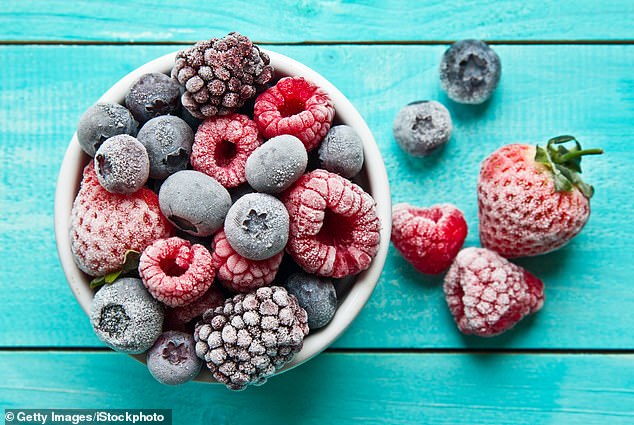
Frozen fruit does not require preservatives to extend its shelf life
TRY CAN
Thirty-eight percent of tomatoes tested contained PFASs, so what are our alternatives? Try red bell peppers, rich in vitamin C and lycopene, excellent for heart health. But sometimes just a tomato will do. So if you’re making a sauce, use organic canned tomatoes (higher in lycopene than fresh), cheaper and relatively low in pesticides. Or use double-concentrated organic tomato paste, cheap, delicious, sweet, and packed with lycopene. Again, if it’s organic, it’ll be lower in PFASs.
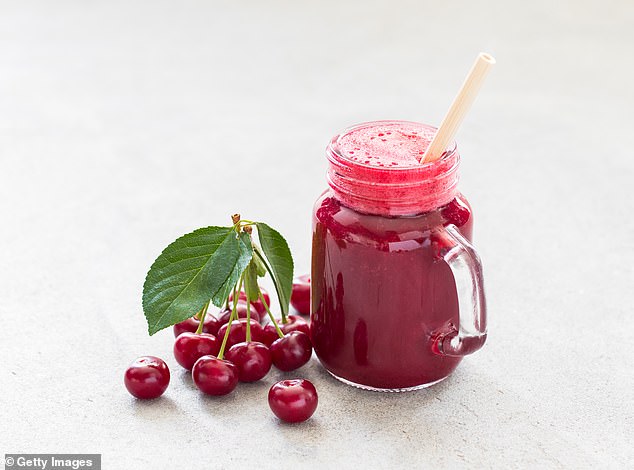
Cherry juice may help reduce inflammation and improve sleep quality
SAP BOOST
Cherries are good for us, despite the fact that 56% of those tested contained PFASs. Although you can drink tart cherry juice instead, for health benefits like reduced inflammation and improved sleep quality. If the juice is organic, it will contain minimal chemicals, as well as a much higher concentration of beneficial flavonoids. But if you prefer, you can substitute cherries with cranberries, known for their urinary tract health benefits and antioxidants. (Reassuringly, fruit juice company Ocean Spray recently rejected cranberries grown in an area contaminated with PFAS. Further three-year testing by the U.S. Food & Drug Administration found that almost none of the cranberry samples contained detectable levels of PFASs.)
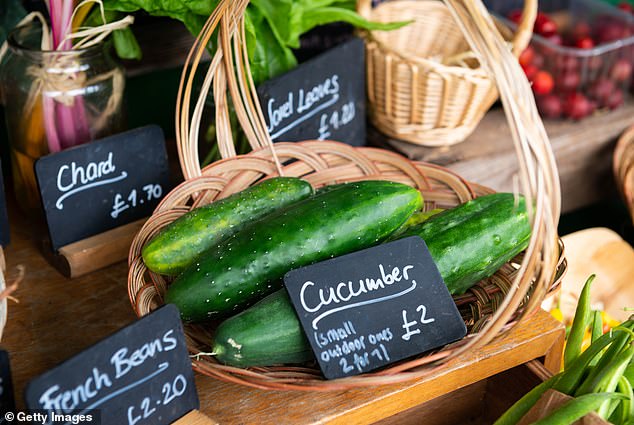
Go to your local farmers market and be curious about where your produce comes from, says Gabriela Peacock
AWAY FROM THE SUPERMARKET
Cucumbers, apricots, beans, herbs, cabbage, lettuce, potatoes and apples are much lower in PFAS, but if you are still concerned, buy organic if possible, as they tend to be lower in chemicals. Consider UK-grown produce as opposed to imported fruit and vegetables, as some countries may have more lenient pesticide restrictions than the UK. Additionally, imported fruit and vegetables require an extra level of preservation for the journey. As I tell my clients, be curious about where your produce comes from. Don’t always buy from supermarkets. Try your local farmers market instead. Eat local and feel good!
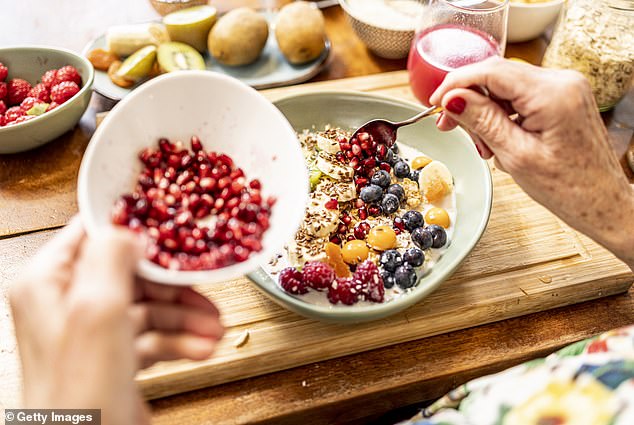
Pomegranates are rich in antioxidants and go well with other fruits for breakfast
INCREASE YOUR VITAMINS WITH VARIETY
If you’re not comfortable with the idea of 61% of grapes containing PFASs, there are some delicious alternatives. Vary your diet with antioxidant-rich pomegranates, digestion-friendly kiwis, or vitamin C-packed oranges. People love grapes, but they’re high in sugar and have little nutritional value. Choose organic when you can. Incorporating a wide variety of foods into your diet and buying organic can help reduce the potential risks of pesticide residues. As the Pesticide Action Network UK notes, of the 490 substances approved for use as pesticides in the EU, only 28 are approved for use in organic farming. Eating this way can help ensure you’re getting a wide range of vitamins, minerals, and health-promoting compounds.
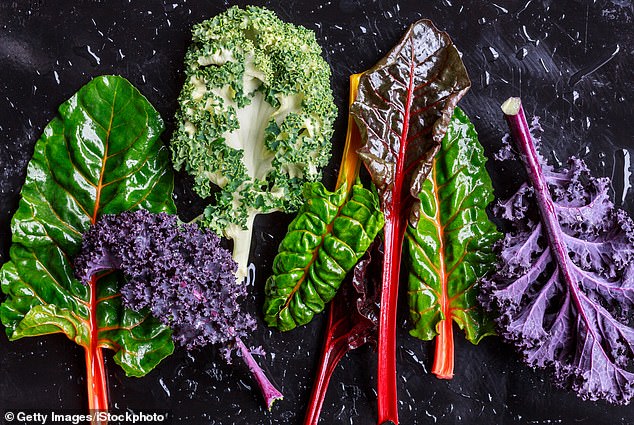
Purple kale and Swiss chard are packed with vitamins A, C and K
PASS ON PLASTIC-WRAPPED PRODUCTS
Forty-two percent of spinach samples contained PFASs, so swap the spinach for a mix of other leafy greens like kale, Swiss chard, and collard greens, which are packed with vitamins A, C, and K, and minerals like calcium and magnesium (though they may have similar PFAS levels, eat fewer leaves per serving). And don’t forget cruciferous vegetables like broccoli and Brussels sprouts, which are rich in antioxidants and have anti-inflammatory properties. Some leafy greens may have higher PFAS levels because—as noted by a study last year in the journal Food Chemistry—plants accumulate PFAS from the environment, taken up through their roots or leaves, or through exposure of their edible parts to pesticides during growing. If possible, buy minimally packaged, uncut vegetables—the study also found that “washing, cutting, packaging” can increase contamination, and “ready-to-eat produce had higher concentrations of PFAS” compared to fresh and frozen vegetables.
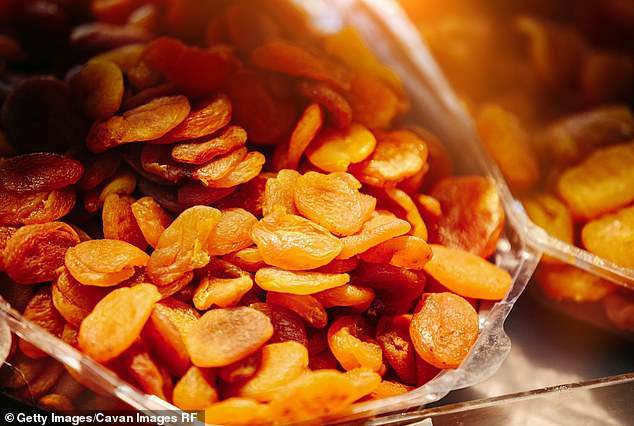
Dried apricots are rich in vitamins A and C
SUPERFOODS WITH SKIN
Analysis found that 38% of peaches and nectarines contained PFASs. As an alternative, try organic dried apricots, which are rich in vitamins A and C, or prunes, which are packed with antioxidants. Or opt for mangoes, which offer similar health benefits, plus a boost for skin health. The obvious advantage is that you’re not eating the skin of these fruits, so you’re not ingesting any topical chemicals. Incidentally, a 2017 Australian government test – albeit on just two samples – found that mangoes were below the “trigger point” for PFASs in fruit.
- Gabriela Peacock is the bestselling author of 2 Weeks to a Younger You: Secrets to Living Longer and Feeling Fabulous (gpnutrition.com)
